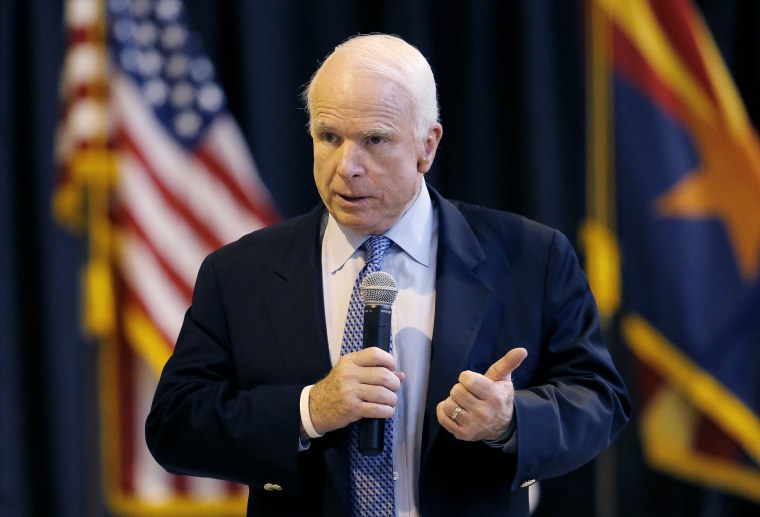It was just last week when Sen. Kelly Ayotte (R-N.H.)
delivered a Memorial Day message in which she urged Americans to keep Army Sergeant Bowe Bergdahl "in our thoughts and prayers." She added, "I renew my call on the Defense Department to redouble its efforts to find Sergeant Bergdahl and return him safely to his family."
Less than a week later, the Defense Department announced that Bergdahl had been freed and he'll be returned safely to his family -- prompting
a new round of criticism from Sen. Kelly Ayotte (R-N.H.).
But all things considered, these conflicting statements are mild compared to Sen. John McCain (R-Ariz.) and his recent reversals, highlighted today
by Doug Mataconis.
The Arizona senator, himself a former prisoner of war, initially balked at the idea of a prisoner swap, calling the idea in 2012 "bizarre." A few months ago, however, McCain
changed his mind.
U.S. Army Sgt. Bowe Bergdahl has been held by a group with ties to the Taliban for almost four years, and the group has demanded the United States release five Taliban prisoners in exchange for him. The Washington Post reported that U.S. officials confirmed that talks among diplomats and the Pentagon were under way. The official U.S. policy is not to negotiate with terrorists, but the military is winding down operations there by the end of the year and could risk leaving Bergdahl behind, CNN noted. McCain said his stance has changed only because the previous proposal was to release five "hard-core" Taliban leaders as a "confidence-building measure." The current proposal would be an actual exchange of prisoners. "I would be inclined to support such a thing, depending on a lot of details," he said.
Update: Asked specifically by CNN's Anderson Cooper about the prospect of a 5-for-1 prisoner exchange, McCain
replied, "I would support. Obviously I'd have to know the details, but I would support ways of bringing him home, and if exchange was one of them, I think that would be something I think we should seriously consider."
That was in February.
McCain appears to have
change course again after the Bergdahl announcement was made over the weekend.
While McCain, himself a former prisoner of war, said he was "pleased" by Bergdahl's release in a Saturday statement, he sounded a more ambivalent note on Face the Nation the following day. "It is disturbing that these individuals would have the ability to re-enter the fight, and they are big, high-level people, possibly responsibly for the deaths of thousands," he said.
As best as I can tell, McCain has not explained why he was "inclined to support" the same deal the Obama administration actually struck, which the senator is no longer inclined to support.
Update: Yesterday, McCain suggested that it's best not to dwell on the prisoner-swap decision. “It’s worthy of a hearing, but it's done,”
he said. Today, McCain adopted a
different posture, telling reporters, “This decision to bring Sgt. Bergdahl home -- and we applaud that he is home -- is ill-founded … it is a mistake, and it is putting the lives of American servicemen and women at risk. And that to me is unacceptable.”
Another Update: Sen. Ayotte's office emails with a statement: "Senator Ayotte has led efforts in Congress to prevent the release of high risk detainees from Guantanamo, and she never would have supported trading five dangerous terrorists who are likely to reengage in terrorist activities against Americans and our allies. She is troubled that the administration did not fully comply with the law requiring advance Congressional notification, and she believes it is important for Congress to investigate the critical national security implications of this decision, which is why she has called for the Senate Armed Services Committee to convene a hearing without delay."
